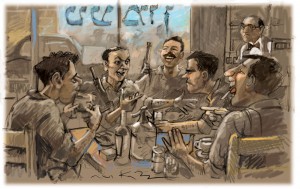Haim Watzman
She laughed and shook her head as she unrolled the clingy plastic from around her slug-shaped sandwich. Down below, raucous teenagers gamboled in a spring that seemed to be the source of the river along which she and her companions had hiked all morning. She laughed at how easy it had been not to think about it, how well her plan had gone. Her companions were no longer visible ahead. Soon they’d wonder about her and send someone back in search. In the meantime, she’d have something to eat.

illustration by Avi Katz
The rains had not yet come, yet the Tzipori River had flowed gently but surely along its terraced channel as they walked beside it that morning. At one point it bowed and nearly circled a low hill on which a tiny village perched. Children played in a schoolyard. The leader had given the village a name that she could no longer remember. Further on was an old millhouse that you could now rent out for weddings and bar mitzvahs. There the trail had crossed the river (all of three meters wide) and she had followed the others over half-submerged stones. The water, which the leader said was partly sewage, washed over her boots. Last to cross, she had probed the riverbed with her poles to steady herself. She thought of turning back but did not.
She hadn’t hiked seriously since her teenage scout years, which were three decades past by now. Back then, at tough spots, like the river crossing, the boys were always ready and eager to help. Some were very serious about it, as if pulling her up a boulder or guiding her over a narrow spot in a path above a canyon was the very reason that they had been placed on this earth. Others had laughed at her fears, in a big-brotherly way (she was the oldest in her family, and had always wanted a big brother). In this group, today, the others were obliging but cool.
She signed up for the hike because she knew it would be good for her.









